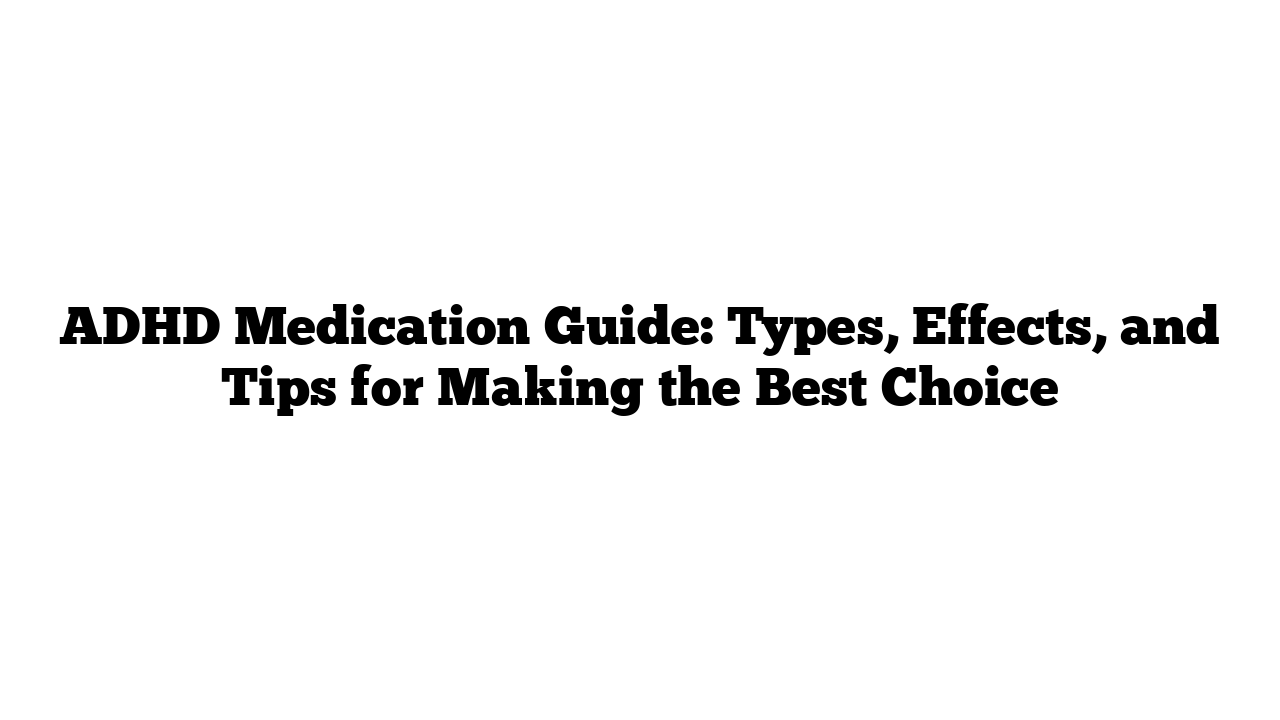Finding the right ADHD medication can feel overwhelming with so many types available and the potential side effects to consider. In this article, we’ll review ADHD medications, from stimulants to non-stimulants, and help you understand which may be best for you. Let’s dive into the types of ADHD medications, how they work, and what people are saying about their experiences.
ADHD Medication Basics: Stimulants vs. Non-Stimulants
ADHD medications primarily fall into two categories: stimulants and non-stimulants. Stimulants are generally the first choice, as they effectively boost levels of dopamine and norepinephrine, which play a role in managing energy, attention, and impulsivity. Non-stimulants offer an alternative, especially for those who don’t tolerate stimulants well.
Stimulant Medications for ADHD
Stimulants are often divided by how long they last—ranging from short-acting to extended-release, which can work anywhere from 3 to 14 hours. Here’s a closer look at some of the most commonly prescribed stimulant medications.
1. Adderall
Adderall, a well-known amphetamine-based stimulant, has been used since 1937. It’s shown to reduce ADHD symptoms in 70-80% of people who try it. Available in both short- and long-acting versions, Adderall can last anywhere from 4 to 12 hours.
User Reviews:
- “I’ve taken 15 mg of Adderall XR for over a decade, and it’s been life-changing for my severe ADHD.”
- “Recently, Adderall makes me very irritable, especially when my concentration is disrupted. It’s frustrating, and I’m considering other options.”
2. Dexedrine and Evekeo
Dexedrine and Evekeo, also amphetamine-based, offer similar effects to Adderall. Dexedrine comes in both short- and long-acting versions, while Evekeo has a slightly different composition.
User Reviews:
- “Dexedrine is my best option; it’s effective and doesn’t cause side effects over time.”
- “After experiencing side effects on Adderall, I switched to Evekeo, which was helpful at first but eventually stopped working for me.”
3. Vyvanse
Vyvanse is another extended-release stimulant that can last 10 to 14 hours, making it one of the longest-lasting options.
User Reviews:
- “Vyvanse is a game-changer for my ADHD symptoms. I can focus better, but I have to take it early in the morning to avoid sleep troubles.”
Methylphenidate-Based Stimulants
These are stimulant medications, but instead of amphetamines, they use a chemical called methylphenidate.
1. Ritalin
Ritalin, a widely used ADHD medication, typically lasts for 3 to 4 hours and is also available in extended-release options. It’s known to have effects similar to Adderall.
User Reviews:
- “Ritalin has made a big difference for my inattentive ADHD. However, after a few hours, I feel a ‘slump’ as the medication wears off.”
2. Concerta
Concerta is another form of methylphenidate that lasts up to 12 hours. It’s known for offering a longer-lasting, steady effect.
User Reviews:
- “Concerta helped me focus during the day, but it increased my anxiety as the dosage went up.”
Non-Stimulant Medications for ADHD
Non-stimulants are ideal for those who don’t respond well to stimulants or experience uncomfortable side effects. The most common non-stimulant for ADHD is Strattera.
Strattera
Strattera is unique because it doesn’t act on the brain’s reward system, which lowers the risk of dependency. It works on norepinephrine, which plays a role in mood and attention.
User Reviews:
- “Strattera helps my anxiety, but I feel spacey, and I’ve noticed a decrease in appetite.”
Deciding on the Right Medication
Choosing ADHD medication is highly individual. While one person may find relief with minimal side effects, another may struggle with issues like anxiety or irritability. If one medication doesn’t work, consult your doctor to try an alternative.
“Everybody’s ADHD journey is unique. Don’t hesitate to discuss your options with your doctor and adjust as needed,” one user advises.
Exploring Natural Alternatives
Some individuals find that medication doesn’t work for them long-term or prefer a natural approach. Techniques such as dietary changes, exercise, and mindfulness have shown positive effects on ADHD symptoms for some people. Experimenting with these approaches under a healthcare provider’s guidance can provide additional tools to manage ADHD.
For more insights, tips, and information on ADHD, visit medicaltimes.io.
